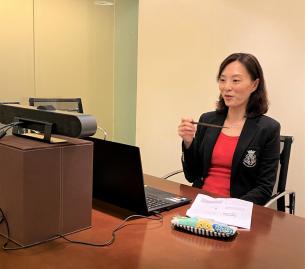Unprecedented challenges arise in work and family throughout the ongoing pandemic. SHKP Club therefore utilised technology to launch a new webinar series called "Stay Strong and Fight the Pandemic" recently. Seasoned Parent and Child Education Consultant Elaine Tang and veteran Clinical Psychologist Priscilla Chan were invited to share with members how to enhance parent-child relationships, stress resistance skills and EQ abilities against the pandemic. The response from participants was overwhelmingly positive, with attendees utilising the online platform to seek tips from the speakers on parenting and psychology. The highlights of the two webinars are shared below so that we can equip ourselves and make it through the pandemic together.
Elaine Tang pointed out that parents are required to work from home while students also need to learn from home. Exhaustion and tension easily build up between parents and their children. However, this rare break from the normal routine can actually be used to improve family bonds, and to develop children's resilience (to the pandemic) as well as their independent learning abilities. You may apply the following five "Keep Having Fun whilst Class Is Out" ideas to organise some family activities that enable you to enjoy precious and quality parent-child time.
• Go on an adventure:
Many outdoors activities make for a fantastic parent-child getaway, such as a beach walk, hiking, a stroll in a country park, etc. You only need to go to one place per trip. Slow down your pace to appreciate the wonders of nature.
• Play family games:
Put on your thinking caps to transform simple, everyday objects such as lai see packets, blocks or toilet paper into creative games. You can create a "Home Playground" without ever leaving the house.
• Read as a family:
Select high quality books and use the different stories and characters for moral education. By discussing your views on the works with children, both parent-child communication and mutual understanding can be improved.
• Enjoy a movie:
Watch a classic Japanese animation by director Miyazaki Hayao along with you kids, which helps them explore the meaning of life and growing up.
• Cook together:
Do not miss out on the chance to cook with your children when having ample time at home. You can pass on unique family recipes representing a "taste of home", and show your love and care.
Q: What is the key to establish successful parent-child relationships?
A: "Love" and "Time". Spend more time with your children, let them feel your love, believe in their abilities and encourage them often. Make the most of your time "Staying Home to Fight the Pandemic" and enhance your relationship and communication with your children.
Q: How to cultivate a child's interest for reading and establish an accompanied reading schedule?
A: Build a solid foundation from a young age. Parents can start this by telling children stories before bed every night, thus building children's reading habits gradually.
Q: How can we teach our children to adapt to and go through the education system in Hong Kong?
A: You should nurture your child in a way that is suited to his or her individual characteristics and not blindly follow the crowd. It is crucial to teach your children the concepts of compassion and gratitude.
Please click here for more webinar highlights (in Chinese only), and watch the webinar video from here.
In light of the emotional distress that many of us are experiencing as a result of the ongoing pandemic, Priscilla Chan pointed out that happiness is predominantly determined by our own behaviours, whereas environmental factors only account for around 10% of our overall happiness. Through a series of studies, real life examples and interaction, she encouraged attendees to respond to adversity brought about by the pandemic with a proactive attitude and with positive thinking. She also proffered five key methods for facing adversity, fostering the belief of "Make the Best of a Bad Situation".
• Strengthen your sense of control:
Although we cannot control the pandemic, we are in charge of our daily routine and schedule. Align your body and mind, make plans and get your life in order, you can feel a sense of accomplishment.
• Remember that thoughts and actions are interrelated:
Your thoughts and behaviours can influence one another. When you are stressed and unhappy during the pandemic, you must remain positive believing the challenges can be overcome. Smile more, turning your positive behaviours into optimism.
• Stay connected:
It is important to stay in touch with your friends and family during anti-epidemic times. Talking on the phone, or via social media can let you express care to the beloved and make you pleasant. Never leave anything unsaid to your loved ones.
• Maintain an attitude of gratitude:
"Live in the moment" as there are many variables during a pandemic. Appreciate, praise and thank the people around you for their efforts. You can also maintain happiness by writing down or telling others the things that you are grateful for.
• Act of Kindness:
Helping the people around you and those in need in society during the pandemic, such as doing volunteering work together with your children. This does not only make others feel the warmth, but also bring you satisfaction.
Q: How to transform stress into motivation?
A: Mindset is critical. The more self-confident you are (e.g. strengthening your sense of control), the more successful you will be at dealing with the pressure and challenges brought about by the pandemic.
Q: What should we do when faced with negative emotions?
A: Emotions are neither good, nor bad. For example, when you feel sadness or anger, it is just a reflection that you have an inner need that has not been responded to or is not yet satisfied. You need to get to grips with the underlying cause in order to find a way to resolve this.
Q: What can I do for those around me who are lacking positivity?
A: Maintaining a positive and happy mood is first and foremost. In addition, you can use meditation or breathing exercises to transform the feelings of missing someone into thoughts of love and care for them. If necessary, you can seek the assistance of a social worker or psychologist.
Please click here for more webinar highlights (in Chinese only), and watch the webinar video from here.







